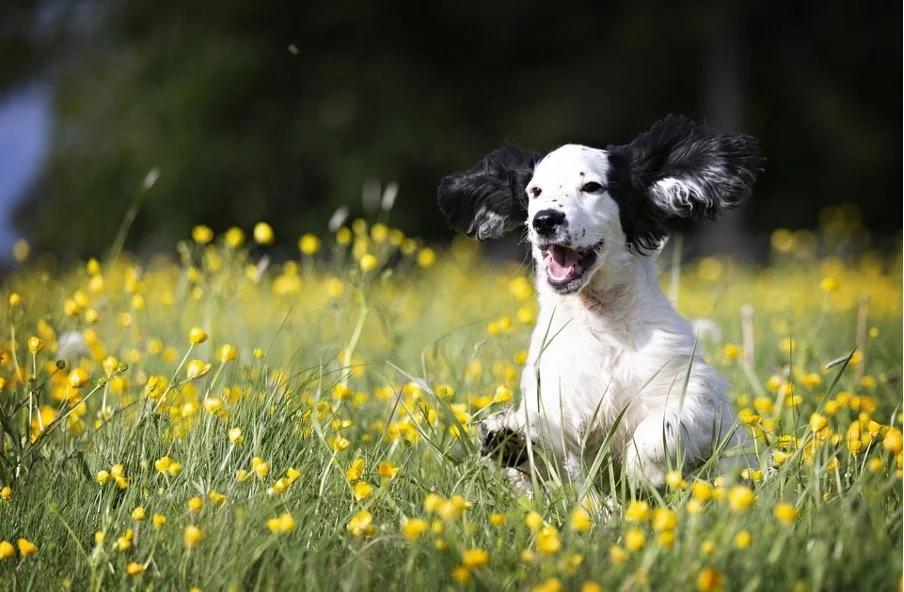Pet Blog > Upper Respiratory Infections in Dogs
How Should You Treat Upper Respiratory Infections in Dogs? Things You Must Do
Upper respiratory infections are contamination commonly caused by bacteria, viruses, and parasites, affecting parts such as the nose, throat, bronchi, and sinuses. These infections are quite contagious and can easily be transferred by sneezing, coughing, and sometimes by touching as well.
Like us, our dogs can also get affected by these infections. Dogs can get them from shelters if they stay with ill animals due to their highly contagious nature. If you have other sick pets living under the same roof, your dog will likely catch these infections.
To treat upper respiratory infections in dogs, you must first understand the symptoms and take your pet to the vet. Give your dog proper treatment and therapy, and follow some precautions to stay safe.
Symptoms of Upper Respiratory Infections
Not all dogs will show the same symptoms of upper respiratory infections. Some may show cold symptoms that can be remedied with homely treatments, while others may require medical attention. Here’s a list of all the symptoms that dogs show, which can vary across dog breeds:
● Runny nose
● Eye discharge
● Itchy nose
● Sneezing
● Sore throat
● Coughing and wheezing
● Breathing problems
● Fever
● Conjunctivitis
● Lethargy
● Loss of appetite
● Drooling or foaming
● Dehydration
● Mouth or nose ulcers
While some symptoms can be typical for all types of infections, others are unique to the diseases they’re suffering from. A certified vet can identify the diagnosis and provide treatments accordingly.
Causes for Upper Respiratory Infections in Dogs
Symptoms of upper respiratory diseases can vary from one dog to another. While some dog breeds can show fewer symptoms and recover quickly naturally, others need special care. Factors like lack of exercise, aging, and a weakened immune system can make your dog vulnerable to infections.
Let’s say that you have a Golden Retriever. If you got it from golden retriever breeders and it was already infected, it may have contracted something from the breeding station. Identifying the symptoms of upper respiratory infections can help you treat them accordingly.
● Bacterial Infections
One of the most common bacterial infections in dogs, Bordetella bronchiseptica, can spread from other infected dogs through coughing, shared water bowls, and clothes. This bacteria and Streptococcus can cause pneumonia and sometimes bronchopneumonia in puppies.
Bordetella bronchiseptica can also cause nonspecific infectious rhinitis, which is not common in dogs. Bacteria such as Streptococcus, Pasteurella, Pseudomonas, and coliforms are secondary agents in a bacterial infection known as infectious tracheobronchitis or kennel cough.
Symptoms of these diseases can include coughing, sneezing, wheezing, lethargy, and an itchy nose. With severe infection, your dog may also suffer from fever and anorexia.
● Viral Diseases
Dogs can contract various canine viruses, such as parainfluenza virus, canine herpesvirus, canine influenza virus, canine pneumovirus, and canine respiratory coronavirus. Symptoms include harsh coughing, constant nasal and eye discharge, fever, and lethargy. In rare cases, these can cause death as well.
These viruses can cause pneumonia and other upper respiratory infections that can weaken the immune system and invite bacterial infection. Timely treatment and proper care should recover your dog quickly.
● Parasitic Infections
Dogs can get upper respiratory infections from parasites such as worms or insects, such as mites and maggots. These invade the entire upper respiratory tract consisting of the windpipe, throat, and mouth and can also travel to blood vessels.
You can see your dog wheezing in reverse, having difficulty breathing, will snort frequently, and may also have a runny nose. If not treated promptly, your pet may need to undergo intensive treatment.
Treatments for Your Dog to Recover Quickly
The first step you must take whenever you see the symptoms of upper respiratory infections is to take your dog to the vet. With careful examination and lab work, they will provide the proper treatment and therapy for your pet.
Proper diagnosis and treatments help dogs overcome upper raspiratory infections quickly, however, old or ailing pets do take longer recovery time. The following are the things that your vet will prescribe for your dog, including some home treatments.
1. Supportive Care and Therapy
For mild infection symptoms, proper care and therapy will be ample to get your dog on its feet soon. Keep your pup well-hydrated and try to feed it nourishing food even when it’s losing appetite.
Ensure your pet doesn’t run around or do energetic activities during its treatment to reserve some energy to recover properly. Prepare a warm, cozy, and quiet corner for your dog to rest well and feel safe. And, of course, wrap your pup in a blanket, especially when it’s cold outside.
2. Steaming
Steam treatments are as effective on dogs as on us. Mucous accumulated in air passage is the primary breeding ground for all the germs and parasites. Steaming can soften and break down mucous clogging your dog’s nose and windpipe, letting your pup breathe better and demolishing the breeding ground for the germs.
Steaming can also soothe your dog’s air passage by moistening it, preventing the dryness that can cause static and asthma. Place a humidifier near your dog’s bedding, or let your dog in a steamed washroom.
3. Vaccinations
Vaccinations are a surefire way of protecting your dog from upper respiratory diseases. As soon as you adopt your pet, take it to your vet, get every vaccine possible, and maintain the booster shots as scheduled.
Vaccines will create antibodies in your dog’s body by inducing specific symptoms of the targeted infections. This will ensure that your pup’s body responds quickly to any future infectious attack and can cope with timely vaccine boosters.
4. Antibiotic Courses
If your vet finds a bacterial infection after doing lab work on your dog, they will prescribe antibiotic courses. The length and frequency of the antibiotic course will depend on the type of bacteria that has attacked your dog’s upper respiratory system.
Your doctor may prescribe injectable antibiotics or capsules, depending on what your dog can take. Even if your pet has a viral infection, your vet may prescribe an antibiotic course, as viral attacks can weaken the immune system, increasing the chances of bacterial invasion.
5. Antiviral Treatments
If your vet detects a viral upper respiratory infection in your dog, they will prescribe antiviral medicines. These medicines work by blocking receptors in the membrane of the viruses, preventing them from binding to healthy cells. This way, they shorten the lifespan of the virus cells as they can’t attach themselves to the host cells, eventually starving to death.
Because of the way antiviral treatments work, they may also inhibit healthy cells. This will suppress the immunity for a while. However, your dog will recover as soon as all the virus cells expire.
6. Other Medicinal Treatments
Upon the nature and severity of the symptoms, vets can treat upper respiratory infections in dogs using other medications, such as those for deworming if the infection is due to parasites. Your dog may also need to receive intravenous treatments and take nasal drops or ear drops for decongestion. Your pup may also need to take pain medications and sprays to ease the pain.
Precautionary Measures
Besides medicines, therapies, and other treatments, you must provide your dog with some general care. It will ensure your pet recovers quickly by constantly breaking the breeding grounds for germs. You must also clear out any infestation, especially if you have a pregnant dog and need to care for her.
Following are some precautions you must carry out to help your dog recover quickly and not contract upper respiratory diseases anytime soon.
● Clean Nose and Eyes Constantly
Regularly cleaning the nose and eyes will keep germs at bay for your pet, whether you see some discharge or not. Your vet may prescribe nose and eye drops as an additional maintenance care.
With a clean cotton bud or a clean cloth, wipe your dog’s nose and eyes to get rid of any dirt and mucous build-up. The drops will help you break down the dirt and mucous to aid in cleaning while disinfecting.
● Hydrate Your Dog Constantly
Hydration is necessary to treat upper respiratory infections in dogs as it helps the body to recover quickly. Your dog may suffer from a loss of appetite and lethargy due to the illness.
To help your pet with it, you may add some chicken broth to your dog’s water bowl. This will supply necessary minerals while also rejuvenating the taste buds.
● Clean Bedding and Clothes
It’s vital that you always provide your dog with clean bedding and clothes. Wash them at least once a week to get rid of dirt and grime since dogs can bring home germs and parasites with them in their fur and other body parts.
● Keep Away From Infected Animals
If you have other pets in your house, you must ensure to keep your dog isolated, as it can spread its infection to others. And if you have another ill pet, keep your dog away from that pet until it has recovered.
You must take precautions for yourself as well. Keep yourself as far as possible from the ill pet. While tending to it, wear protective clothing and gloves, and sanitize yourself properly after you come in contact with them.
Conclusion
To diagnose your dog’s symptoms, make sure to take it to the vet. Offering them treatment without confirming with a vet may cause more harm to their health, and upper respiratory infections. Otherwise, there’s a high chance your dog may relapse without pre-care and after-care.
With the advice and proper treatment by the vet, you can save your dog from the consequences of pneumonia and parasitic infections. And if you have a puppy as your pet, be extra cautious as they’re very prone to illnesses.
Check out our other Dog Blog articles
Return to the Pet Blog


